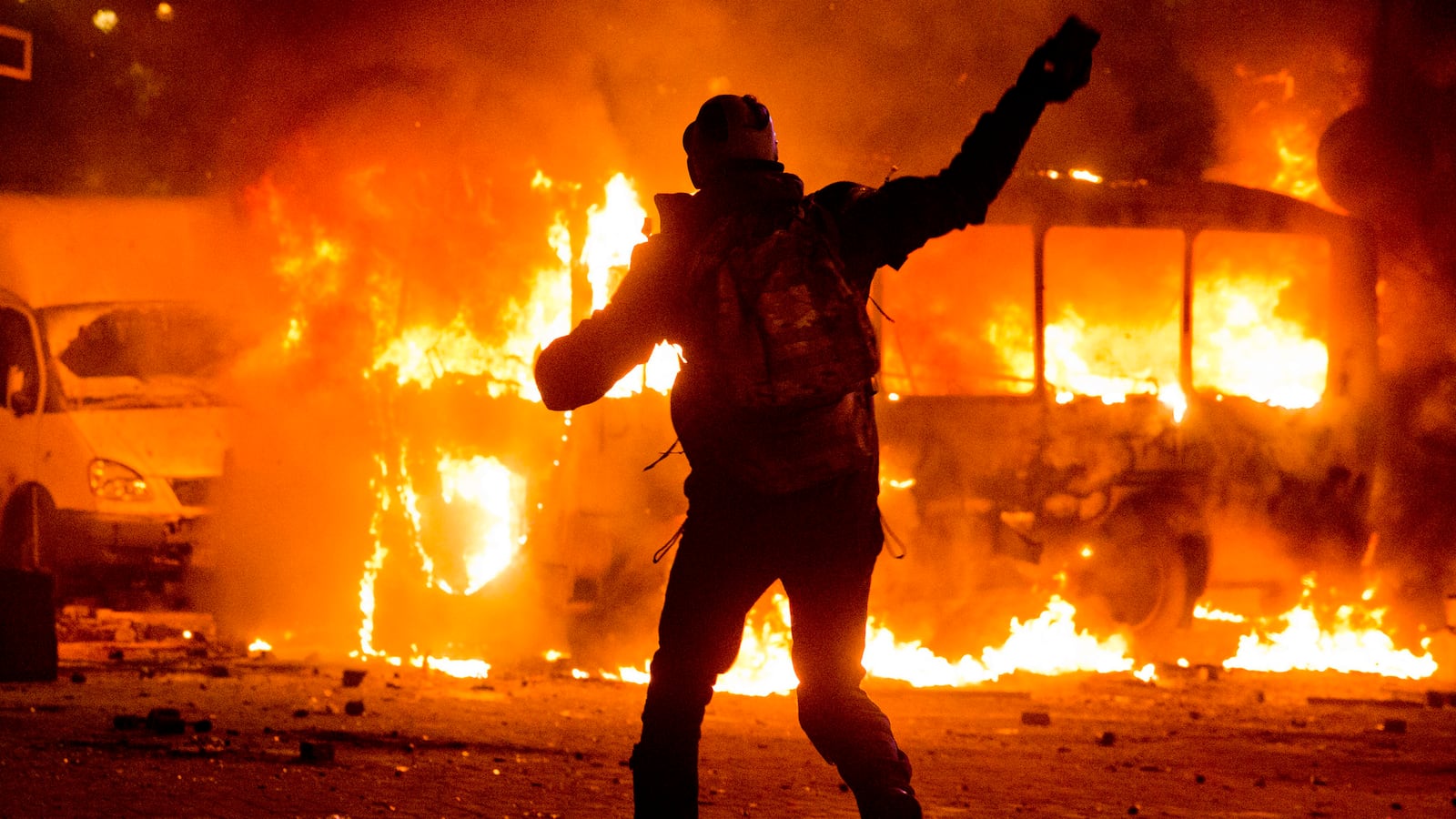The day promised to be an inspiring one for the Ukrainian opposition: Once again, more than 100,000 protesters gathered on the Maidan Nezalezhnosti, or Independence Square, the symbol of freedom for the thousands of Ukrainians who dream of joining the European Union. And yet Sunday saw the normally peaceful and non-violent Maidan quickly embroiled in hostility and chaos, as tensions erupted with authorities and scores of protesters and policemen were injured in the clashes. As of last count, over 100 policemen have been injured and 50 hospitalized, including several whose riot shields caught fire and engulfed them in flames. Reports say at least 40 protesters have been hospitalized for injuries, including four reporters.
By the time night had settled over Kiev, the heart of the pro-EU revolution looked hopelessly deserted, and protesters expressed their fear that Ukraine is slipping into the kind of heavy-handed authoritarianism typical of most of its post-Soviet neighbors.

Today’s violence wasn’t the first time that police have cracked down on pro-EU protesters in the Maidan—on December 1, riot police severely beat young activists, which fired up the opposition and drew many Ukrainians to its cause. After a brief pause for the holidays and the New Year, the protests seemed to be gathering steam again this weekend. High-profile speakers addressed the crowds assembled in downtown Kiev, including former admiral Igor Tenyukh, who admonished the Ukrainian army from the square: “In case of a violent scenario, criminal orders to use weapons against peaceful citizens, do not allow authorities to use you to establish a North Korean-style dictatorship!”
Alongside Tenyukh, former heavyweight boxing world champion, Vitaly Klitschko—now a leader of the Maidan activists—yelled from the stage that the opposition intended to “announce snap presidential elections,” which drew an impassioned, if equivocal, response from the crowd—many in the square believe that the opposition still lacks a good presidential candidate, and had turned out in the freezing cold not to support a rival political party, but to denounce the hypocrisy, alleged corruption and human-rights abuses of the government of President Viktor Yanukovych.
“People can sense when they are lied to—it was obvious that every opposition leader on the stage hoped for a chance to be turned into our president right on the spot,” said Vera Klimova, a devoted Maidan protester, in an interview with The Daily Beast.
Around 3pm, hundreds of protesters started walking towards the government buildings in downtown Kiev, as opposition leaders announced that today was the last chance to defend the Maidan and prevent Ukraine from turning into a “police state.” The most radical activists began pushing and rocking a bus that had barricaded the way to the Parliament building. “I could hear stun grenades go off; some young radicals, must have been tetushki (“provocateurs”), set a bus on fire—that was clear for us, that the [spirit of the] Maidan was over,” said protester Yelena Svetlitskaya.
It is not yet known whether the activists who provoked the clashes were veterans of the Maidan, or whether they were, as the opposition claims, pro-government youth and soccer fans who were encouraged to provoke the police to violence. Ukraine recently passed a new law that would punish anyone found guilty of encouraging fighting to 15 years in prison.
As the police rushed in to contain the crowd, opposition leaders called in vain on protesters to avoid violence. By midnight, activists continued to set police vans on fire, while others threw cobblestones and wooden sticks at the police’s shields; the officials fired back with tear gas. Klitschko and other opposition leaders had already left to visit President Yanukovych at his residence and negotiate the Maidan’s future.
“It all looked like some show at a circus, but a violent one; the most betraying detail for people was to see the opposition leaders leave the Maidan,” said Ilya Isupov, a Ukrainian modern artist, observing today’s events. “They all have salaries and warm places in life, unlike thousands of the poorest Ukrainians, who supported them for weeks day and night.”




